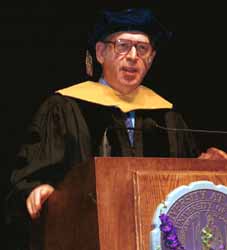GRADUATE COMMENCEMENT CEREMONY
MAY 19, 2001
RECREATION AND CONVOCATION CENTER

Photos by Mark Schmidt |
Remarks by Jerome I. Friedman, Ph.D. Nobel Laureate in Physics Institute Professor, Massachusetts Institute of Technology |

Photos by Mark Schmidt |
Remarks by Jerome I. Friedman, Ph.D. Nobel Laureate in Physics Institute Professor, Massachusetts Institute of Technology |
President Hitchcock, Faculty, Graduates, Families and Friends,I am deeply honored and enormously pleased to receive this honorary degree from the State University of New York. I want to thank President Hitchcock, the University and the selection committee for this very special recognition.
First, let me congratulate the parents for producing this wonderful group of graduates and providing both support and encouragement that enabled them to reach this goal. Next I want to congratulate the graduates. I want to congratulate them for staying the course, working diligently and reaching this educational milestone.
This occasion is a time of great celebration, but it is also a time of reflection about the future you are entering. The world is changing very rapidly, driven to a large extent by science and technology. The development of humankind has been strongly linked to the innovations arising from human creativity, from the earliest crude tools to the modern technological society of today. In the modern era, science and technology have provided innovations that have enhanced our standard of living, improved our health and driven our economy.
What can we say about the innovations of the future? It is clear that there will be technologies created that we cannot even imagine that will emerge from new scientific knowledge.
Think of a person in the year 1901 trying to imagine what would exist in 2001. What is so familiar to us today would seem like magic. Even great scientists fall short in their ability to predict technological advances. Lord Kelvin, one of the greatest physicists of the 19th century asserted in 1885: "Heavier-than-air flying machines are impossible." He could not foresee the invention and development of the airplane which has made our entire planet so accessible. And the idea of human beings walking on the moon would have seemed totally preposterous.
In an another example, Ernest Rutherford, Nobel Laureate and discoverer of the atomic nucleus, said in 1933: " Anyone who expects a source of power from the transformation of the atom is talking moonshine."
It is ironic that Enrico Fermi produced the first self-sustaining nuclear chain reaction at the University of Chicago only nine years later. Clearly, it is dangerous to predict what human ingenuity cannot achieve. And as Yogi Berra is alleged to have said: "It�s tough to make predictions, especially about the future."
In trying to make projections about the future, we can only think of sophisticated developments of current technologies — unless we resort to science fiction. Even such developments are difficult to foresee. In 1987, one would not have predicted such a thing as the World Wide Web, which only was started in 1990 and is reshaping the way we communicate, learn and engage in commerce.
However, there are developments already in place that suggest that within the next century there will be enormous scientific and technological progress.
There are many examples; but I will only give three, all in different disciplines:
The ongoing revolution in biology will affect our lives in many ways. Applications which utilize our understanding of the genomic structure of the cell and its inner workings may make it possible to eradicate almost all diseases and also create a new green revolution which could alleviate hunger across the world.
There are great strides to be made in energy production. The development of renewable energy sources and of plasma fusion technology may provide almost limitless, environmentally benign energy for all humankind.
We would not only harness the energy of the sun more efficiently, but we would also be able to duplicate on earth the processes in the sun that produce energy.
The creation of increasingly more powerful computers and computational algorithms will vastly enhance the power of artificial intelligence and make it possible to employ smart robotics that will greatly reduce human drudgery. All of these developments would affect how we live in profound ways.
It is clear that the exponential growth of science that has shaped our lives can be expected to continue in the 21st century. But scientific disciplines and the innovations they produce are fragile and require the proper conditions to flourish. Among these are the following:
- There must be strong support for basic and applied research from government and industry
- The nation must attract more young people to pursue careers in science and engineering
- We must enhance programs in our educational system that encourage and nurture creativity
- And the nation must maintain strong research universities. They are the source of cutting-edge research and of the future scientific work force, and without this work force we will have no future science.
I have spoken only of the utilitarian value of science. But it is important to emphasize that science has immense value in itself.
Research is driven by some of our deepest yearnings, the desire to know and understand. What we have learned from science has profoundly shaped the way we view our place in the universe. It has provided us with some understanding of how the universe works from the basic building blocks of the subatomic world to the outer reaches of the cosmos. And evolutionary biology has given us an understanding of our place in the natural order of life.
Although science has enormous promise for further bettering the human condition in the future, its promise will only be fully realized if it is humanely applied, its benefits are shared across the world, and we protect the environment.
This last point is of major importance because no matter how much we try to improve our standard of living we ultimately are impacted by the environment in which we live.
Human activities are threatening the global biological and geophysical systems on which all life depends. One of the greatest challenges we face is creating a sustainable world.
Science and technology have indispensable roles to play in reducing environmental problems, but they cannot, in themselves, provide a magic bullet. To counter these threats, nations across the world also have to develop the political will to make the right choices.
The developed nations of the world put enormous pressures on resources and on the global environment and thus have a special responsibility to work to solve these problems. They also must aid and support developing nations in reducing their pressures on the environment. This would not be an act of altruism, because wealthy nations cannot escape the harmful effects of a globally damaged environment.
The rest of the world looks to the United States for leadership, and I think our nation must also take a leadership position in this area. I am confident that we will develop the political will and technologies to enable us to play a significant role in helping reduce the world�s growing environmental problems
You, the members of the graduating class, have received a superb education — an education that provides a foundation on which you can build throughout your lives. Many of you will become leaders and opinion makers, and all of you have much to offer our great nation.
Your education provides opportunities for exciting and rewarding careers; but it also places on you a significant responsibility to participate actively in the political discourse that will guide our nation. The nation needs your help to create a bright future. It needs your ingenuity, your hard work, and your idealism. You are the brightest and the best, and I am certain that you are well up to the task.
Congratulations, and best wishes for a wonderful future. In closing, I want to thank you for letting me share this memorable day with you.
